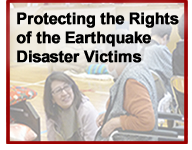After Fukushima's disaster, human rights of the affected people are seriously violated.
On August 17, 2011 Human Rights Now, a Tokyo based international human rights NGO published the Opinion paper on this serious human rights problem.
Human Rights Now urge the Japanese government to take all immediate measure to protect people from radiation.
It underscores that Japanese government should immediately grant the right to evacuation and reparation for all the people living the area above 1mSv/year radioactive contamination level.
http://hrn.or.jp/eng/activity/20110912_ikensho.pdf
Due to radioactive contamination resulting from TEPCO's Fukushima Daiichi nuclear power plant disaster, the health and daily life of a large number of people that live in the nuclear plant's surroundings are being subject to considerable risk.
After the nuclear disaster, it has been estimated that the amount of radioactive materials released is over 168 times that which was released by the atomic bomb in Hiroshima, and this creates serious risks to the health of the population, in particular expecting mothers, infants, children and the young generations most vulnerable to harm from radiation, living in wide areas which have not been designated as evacuation areas.
The government is using a standard of 20mSv per year to determine evacuation and compensation measures, however there are no counter-measures in place for the protection and restoration of the health and living standards of the residents living in areas which are subject to a lower radiation amount.
Five months have passed since the nuclear disaster and we are now requesting that permanent counter-measures be taken instead of "provisional standards." The current situation whereby the health of residents is put at risk by applying slack standards conspicuously departing from international norms cannot be tolerated.
Therefore, Human Rights Now, an international human rights NGO requests that the government of Japan and Tokyo Electric Power Company ("TEPCO") assume their responsibilities for causing the damage resulting from the Fukushima nuclear disaster, as follows:
1. Take all necessary measures to protect the health and restore the living environment of the residents living in areas where the radiation dose exceeds 1mSv per year (excluding background radiation) in accordance with international standards and the standards applicable to the contaminated zones following the Chernobyl nuclear disaster.
2. Follow the practices of the Soviet Union, the Russian Federation, the Ukraine and other countries after the Chernobyl nuclear disaster by designating the contaminated areas which are subject to a radiation dose in excess of 5mSv per year as evacuation areas, and in areas where the radiation dose exceeds 1mSv per year, recognize the right of the residents to compensation and support for relocation and by providing food supplies, medical care and assistance in their daily life:
· for residents living in areas where the radiation dose exceeds 1mSv per year (excluding background radiation), to take measures for compensation, and for the people who were deprived of their livelihood by relocation, to secure the comprehensive reconstruction of their daily life;
· in areas where the radiation dose exceeds 1mSv per year (excluding background radiation), to monitor constantly and disclose levels of radioactive contamination to the residents, to undertake immediate decontamination for a restoration of the prior environment, to protect from radiation, to provide food supplies, to take measures to provide medical examinations and medical compensation in connection with the influence of long-term exposure to radiation, including internal radiation, and to protect people from radiation injuries; and
· to reconsider the designation of the evacuation areas based on the actual status of the contamination.







